| Admin | ||
| Home | Contents | |
| H&S Policy |
Safeguarding | |
The Church & The World
Church & World
Church & World
Things Past
People & Features
People & Features
Modulo - The Basics

Click on any text in blue to go to that item)
Print this page

What's It All About?

.
Welcome to Modulo - The Basics, a summary in one 'Module' that explains Christianity to help you understand it and to see how its relevant to life today.
You can read Modulo by yourself, or you might join an existing group, such as in a church or school, or you can invite some friends to form your own group, so you can discuss with others your ideas and understanding.
If you're in a group, you might prefer to do Modulo in an informal way using the text to prompt your own thoughts and discussion or you can use the traditional way by reading through the sections first, then discussing the points raised using your own, or the sample questions provided. If you're group is going to read the text aloud, you might like to share the reading between the members so everyone gets involved - whatever suites you best.
(Return to top)
You can read Modulo by yourself, or you might join an existing group, such as in a church or school, or you can invite some friends to form your own group, so you can discuss with others your ideas and understanding.
If you're in a group, you might prefer to do Modulo in an informal way using the text to prompt your own thoughts and discussion or you can use the traditional way by reading through the sections first, then discussing the points raised using your own, or the sample questions provided. If you're group is going to read the text aloud, you might like to share the reading between the members so everyone gets involved - whatever suites you best.
- Module Index
0: A Firm Foundation
1: The Old Covenant
2: The New Covenant
3: The Apostles' Response
4: Authority' Response
- If you’re in a group, we suggest you print-out and give a copy of the text to everyone.
If you would like to know more, see Modulo - The Big Picture, which has several 'Module' that explain each section in more detail.
(Return to top)
(Return to Modulo Home Page)
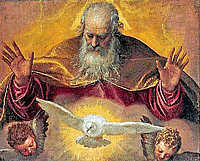
Does God Exist - What's he Like? No-one can prove God exists, but equally no-one can prove he doesn't either. Christians experience the presence of a caring 'supreme being' that has always existed whom we call 'God' otherwise (i) who created God and (ii) what caused the 'Big Bang' that created space and time? The evidence suggests God created everything - including the Big Bang; therefore, he's eternal; he has, and will always exist because he's outside of time - he created it. When we can't prove something, but logic says it's a reasonable conclusion, we believe it 'in faith'.
A helpful way to think of this is to look at the evidence of creation all around us. Scientists have learnt a lot about how it works, 'The How', but they still can't say why it happened or where all the matter that now exists came from. The Bible shows us God is greater than a human, which is why we can't explain him. He's like three persons in one, a 'Trinity', who can and do act separately but always in perfect agreement, in perfect caring love. Which explains 'The Why'... why we were created. God made the universe to extend his caring love and intends us to return that love, which is why it's in caring for others that we're truly happy.
(Return to top)
A helpful way to think of this is to look at the evidence of creation all around us. Scientists have learnt a lot about how it works, 'The How', but they still can't say why it happened or where all the matter that now exists came from. The Bible shows us God is greater than a human, which is why we can't explain him. He's like three persons in one, a 'Trinity', who can and do act separately but always in perfect agreement, in perfect caring love. Which explains 'The Why'... why we were created. God made the universe to extend his caring love and intends us to return that love, which is why it's in caring for others that we're truly happy.
- The Christian Holy Book, 'The Bible', is a collection of records written over hundreds of years that we use today to discover what others learnt about God before us.
- Since God existed before he created physical matter, he must exist as a 'spirit'.
- Showing loving care even to your enemy isn't soft, is in fact very difficult to do.
- If you want to get to know someone, you need to meet and talk with them. We get to know God by using prayer. It's not 'talking to yourself' but talking to, and listening to God. If you would like help to do that, see Part 6 of Modulo - The Big Picture which includes a simple guide to prayer and praying.
(Return to top)
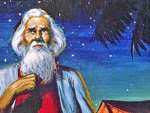
When God determined the time was right, he revealed himself to humanity through a 'righteous' man, Abraham, and his wife Sarah. Their descendants were made slaves in Egypt, but God used a man called Moses to get them released, and through Moses gave us Laws for living together, (The Ten Commandments - see page 3). God made a Covenant (an Agreement) with them (we call it 'The Old Covenant') that he would be their God and protect them if they would obey his Laws. For hundreds of years they weren't able to keep those Laws well enough, so kept breaking the Covenant and causing a separation from God, just like a naughty child is separated from their loving parent. How the result of their breaking the Laws affected their life is recorded in detail in the Bible's first part - 'The Old Testament'.
(Return to top)
- Over many years God sent messengers (called prophets) to remind them of the Agreement, but they ignored them all, so God wasn't able to protect them. The Old Testament describes those events and reveals how they suffered as a result of their disobedience. We call that disobedience 'sin'.
- Sin spoils creation as God intended it to be, which is why we have suffering, because nature no longer behaves as God originally created it.
(Return to top)
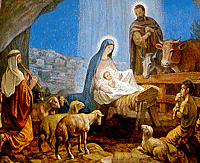
To put right our disobedience of his Laws (sin), God needed someone who had no sin and there was no-one that good, so God came himself in the human form we know as 'Jesus Christ'.
Jesus had to act on our behalf, so he had to be like us in every way. As a result, he was born as a human baby, both God and human at the same time. We don't know how God could do that, but if he created space and time out of nothing, then he could certainly do that too. Just as his birth was due, his mother and her husband Joseph had to go to the home town of their ancestors (Bethlehem) to be counted in a census. The town was crowded with similar visitors, so there were no spare rooms; consequently Jesus wasn't born in an inn but in an outhouse - a stable.
Shortly after his birth Jesus was declared a king by 3 visiting 'wise men' so the local king at that time (called Herod) felt threatened and killed all boy babies to avoid a competitor, but Jesus' parents were warned and took the family to Egypt as refugees until Herod died and the threat was removed.
On their return from Egypt, the child Jesus grew up in the town of Nazareth where Joseph was a carpenter. When he was about 30 years old, Jesus began his ministry - first being baptised ('Christened') for the forgiveness of sin before going off on his own into the wilderness to work out what he had to do and how to do it.
Jesus began by selecting 12 ordinary men as followers to be trained as 'Apostles' (Apostle = someone sent out with a message); then he went about teaching people how to interpret God's Laws correctly and healing people in miraculous ways, which in hindsight shows us he was God as no human can do what he did.
His teaching annoyed the established leaders who were not revealing God properly, so after 3 years they contrived to have Jesus executed to get rid of him. After a sham trial he was condemned to death on a cross as a common criminal.
At his Last Supper with his Apostles, shortly before he was arrested, Jesus said "I give you a new Commandment that you love one another. Just as I have loved you, you also should love one another" (John 13:34). If we try to keep the Commandments, Jesus will speak up for us like a lawyer (an advocate) does in a trial. "If anyone does sin we have an advocate with the Father, Jesus Christ the righteous" (1 John 2:3) (it's called 'The New Covenant').
(Return to top)
Jesus had to act on our behalf, so he had to be like us in every way. As a result, he was born as a human baby, both God and human at the same time. We don't know how God could do that, but if he created space and time out of nothing, then he could certainly do that too. Just as his birth was due, his mother and her husband Joseph had to go to the home town of their ancestors (Bethlehem) to be counted in a census. The town was crowded with similar visitors, so there were no spare rooms; consequently Jesus wasn't born in an inn but in an outhouse - a stable.
Shortly after his birth Jesus was declared a king by 3 visiting 'wise men' so the local king at that time (called Herod) felt threatened and killed all boy babies to avoid a competitor, but Jesus' parents were warned and took the family to Egypt as refugees until Herod died and the threat was removed.
On their return from Egypt, the child Jesus grew up in the town of Nazareth where Joseph was a carpenter. When he was about 30 years old, Jesus began his ministry - first being baptised ('Christened') for the forgiveness of sin before going off on his own into the wilderness to work out what he had to do and how to do it.
Jesus began by selecting 12 ordinary men as followers to be trained as 'Apostles' (Apostle = someone sent out with a message); then he went about teaching people how to interpret God's Laws correctly and healing people in miraculous ways, which in hindsight shows us he was God as no human can do what he did.
His teaching annoyed the established leaders who were not revealing God properly, so after 3 years they contrived to have Jesus executed to get rid of him. After a sham trial he was condemned to death on a cross as a common criminal.
At his Last Supper with his Apostles, shortly before he was arrested, Jesus said "I give you a new Commandment that you love one another. Just as I have loved you, you also should love one another" (John 13:34). If we try to keep the Commandments, Jesus will speak up for us like a lawyer (an advocate) does in a trial. "If anyone does sin we have an advocate with the Father, Jesus Christ the righteous" (1 John 2:3) (it's called 'The New Covenant').
- 'Messiah' is a Hebrew word and 'Christ' is its translation into Greek - both words mean 'Anointed or Chosen One' as Jesus was chosen by God to be the solution to our disobedience (our 'sin').
- Jesus was both God and human at the same time - we don't know how God could do that - we have to believe it in faith.
- As a result of his exile in Egypt, Jesus represents everyone from the rich (a king) to the poor (a refugee).
- We believe Jesus was without sin, but he was baptised to be just like us in every way, and as a sign to mark the beginning of his adult work.
- At his Last Supper with his Apostles, Jesus gave us a way of remembering him using common bread and wine - different Christians give that different names: Holy Communion, the Eucharist, the Mass, or the Lord's Supper.
- Jesus' death was what God had planned all along, because, by his sacrifice on the cross, Jesus made reconciliation with God for the sin of all people who have, or whoever will live (1 John 2:2) Our side of the New Covenant is that we at least try to keep all the Commandments, which we do by trying to love God and our neighbour with our best efforts (Mat 22:34-40).
(Return to top)
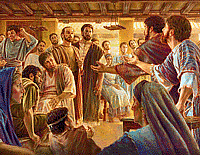
40 days after his human death, Jesus returned to be with God in the spirit world, which we call heaven, and the Apostles waited in Jerusalem as Jesus had instructed them. After 10 days, they received God's gift of his Holy Spirit that changed them from frightened men, afraid the authorities would kill them too, into empowered men who shared Jesus' message with thousands.
At first, they invited people into a 'Closed Fellowship' where they had to convert to the Jewish faith and life-style, but following a vision that the Apostle Peter had, they changed and took the message out to people everywhere, as Jesus had intended.
They travelled into the surrounding countries of that region and met with both success and failure, but overall they were successful in attracting many new members and creating the Christian Church we still have today.
(Return to top)
At first, they invited people into a 'Closed Fellowship' where they had to convert to the Jewish faith and life-style, but following a vision that the Apostle Peter had, they changed and took the message out to people everywhere, as Jesus had intended.
They travelled into the surrounding countries of that region and met with both success and failure, but overall they were successful in attracting many new members and creating the Christian Church we still have today.
- As a result of Jesus making reconciliation for all of us, if we now try to obey God's rules and live as he intended, we too can be with God in his spirit world when we die.
- The Apostle's journeyed into the surrounding countries to share the good news of God's reconciliation, and wrote letters to the churches they started to guide them. Many of those Letters still guide us, because they're included in the Bible's New Testament after the four 'Gospel' accounts that detail Jesus' life and teaching.
(Return to top)
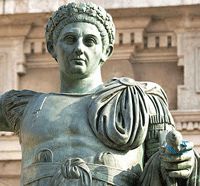
As time passed and the Apostles died, it became obviously Jesus wasn't going to return as soon as many had thought, so scholars now began to work-out what it all meant, and much of our church belief and practice was developed. At first there was considerable agreement, but gradually different areas came to different conclusions, so they began to move apart.
The Roman authorities (who then ruled much of the world) sometimes persecuted Christians, but in 313AD the Roman Emperor Constantine became a Christian and stopped the persecution, and in 379AD, the Emperor Theodosius I made Christianity the only state religion. There was now considerable inter-dependence between the church and the state, which had the advantage of helping Christianity spread more quickly, but the leaders of the church were now often state leaders too.
In those early times, states were managed by powerful men - kings, dukes, and lords - and as the nations and church developed, some of those leaders moved away from the love of God and our neighbour, as Jesus had taught, and introduced non-biblical teaching to their own advantage, sometimes with great cruelty.
By the 16th century some people had begun speaking out against these corrupt practices and brought about reform, helped by scientific and cultural advances (known as 'The Reformation'), and many of those bad practices were corrected with a focus back again onto Jesus' and the Apostle's teaching in the Bible.
Many organisations and individuals also focused on sharing the Christian message with others. In the 19th century especially, world travel became easier and the Christian message was taken out to new areas, particularly parts of Africa and America. From then on, some church members stayed with state and church inter-dependence, such as the Church of England, but others broke away into many new 'free' churches such as the Baptists, Methodists, etc.
(Return to top)
The Roman authorities (who then ruled much of the world) sometimes persecuted Christians, but in 313AD the Roman Emperor Constantine became a Christian and stopped the persecution, and in 379AD, the Emperor Theodosius I made Christianity the only state religion. There was now considerable inter-dependence between the church and the state, which had the advantage of helping Christianity spread more quickly, but the leaders of the church were now often state leaders too.
In those early times, states were managed by powerful men - kings, dukes, and lords - and as the nations and church developed, some of those leaders moved away from the love of God and our neighbour, as Jesus had taught, and introduced non-biblical teaching to their own advantage, sometimes with great cruelty.
By the 16th century some people had begun speaking out against these corrupt practices and brought about reform, helped by scientific and cultural advances (known as 'The Reformation'), and many of those bad practices were corrected with a focus back again onto Jesus' and the Apostle's teaching in the Bible.
Many organisations and individuals also focused on sharing the Christian message with others. In the 19th century especially, world travel became easier and the Christian message was taken out to new areas, particularly parts of Africa and America. From then on, some church members stayed with state and church inter-dependence, such as the Church of England, but others broke away into many new 'free' churches such as the Baptists, Methodists, etc.
(Return to top)
- The Roman Empire eventually split into two parts, as did the church, headed in the west by the Bishop of Rome, known as 'Papa' (Father), in English 'Pope', and in the east by a 'Patriarch'. The two parts gradually developed different interpretation of the Bible's teaching and became distanced from each other until 1054AD, when they separated permanently and became known as the Roman Catholic and Orthodox churches.
- Further splits have occurred since then as people protested against different types of corruption, the protestors becoming known as 'Protestants'.
- For many years it was left to the priest to take the lead on everything, but today many people, especially in the Protestant churches, believe that all baptised Christians are called to share the faith, so more recently there's been an emphasis on everyone having a part to play with the rise of a variety of different 'Licensed Lay Ministers' ie: men and women trained for positions of church leadership and teaching without being 'ordained' as a priest.
(Return to top)
God's Basic Rules For Living
- The Ten Commandments
- The Ten Commandments
| 1 | You shall have no other Gods but me. | |
| 2 | You shall not make for yourself any idol, nor bow down to it or worship it. | |
| 3 | You shall not misuse the name of the Lord your God. | |
| 4 | You shall remember and keep the Sabbath day holy. | |
| 5 | Respect your father and mother. | |
| 6 | You must not commit murder. | |
| 7 | You must not commit adultery. | |
| 8 | You must not steal. | |
| 9 | You must not give false evidence against your neighbour. | |
| 10 | You must not be envious of your neighbour's goods. You shall not be envious of his house nor his partner, nor anything that belongs to your neighbour. | |
| (Return to top) |
.

| 1 | Was there anything from reading this Module that puzzled or surprised you - if so, what? | |
| 2 | In what way does the old, superstitious understanding of God make it more difficult for people to accept him today? How can we deal with that? | |
| 3 | How might the idea of God as ‘Trinity’ (three in one) be difficult to understand? | |
| 4 | Are humans inherently good or bad (is it in our genes?) or does our behaviour reflect our upbringing? How do you explain ‘good’ parents with a misbehaving child or vice versa? | |
| 5 | Jesus showed us how to live according to God’s Laws, which help people live together in society, but in many places today society no longer knows God, so are his forgotten ways contributing to modern society’s ills? | |
| 6 | Did Jesus really die on the cross and if so, did he really come alive again? | |
| 7 | How do you feel about the idea that there’s some sort of life after we die? | |
| 8 | Did the Apostle’s do a good job in taking Jesus’ Message out to everyone? | |
| 9 | How might we each respond to Jesus’ message? | |
| 10 | Is there anything else that’s still puzzling or concerning you? | |
| (Return to top) |
- To View or Print The Questions and Sample Answers, click Here

(Return to top)
What Next?

Modulo - The Basics first explored whether God exists or not (justified by creation) described what he's like (a 'Trinity' of caring love), how we know (The Bible) and how we can build a relationship with him (Prayer).
It then revealed the Old Covenant (an agreement) that God made to protect his people if they obeyed his Laws but they, and we today, can't do that well enough (which we call sin), so we're separated from him like a naughty child is separated from their parents. God's chosen answer (his 'Christ') was Jesus, who gave us a New Covenant that he will speak up in our defence if we at least try to keep his Laws.
It then showed how Jesus' Apostles took his message out to the whole world after he returned to heaven and calls on each of us to share that message today. Finally, it explored how various authorities have responded down the ages to create the church as we know it now.
(Return to top)
It then revealed the Old Covenant (an agreement) that God made to protect his people if they obeyed his Laws but they, and we today, can't do that well enough (which we call sin), so we're separated from him like a naughty child is separated from their parents. God's chosen answer (his 'Christ') was Jesus, who gave us a New Covenant that he will speak up in our defence if we at least try to keep his Laws.
It then showed how Jesus' Apostles took his message out to the whole world after he returned to heaven and calls on each of us to share that message today. Finally, it explored how various authorities have responded down the ages to create the church as we know it now.
(Return to top)
- If you only want an overview, then this Module is sufficient, but if you would like to know more, go on to Modulo - The Big Picture which develops the explanations given in each section in more detail and suggests ways to get to know God for yourself.
(Return to top)
 St Mary's Church, Dymock
St Mary's Church, Dymock